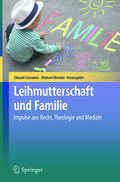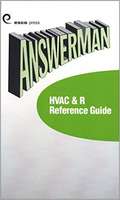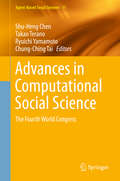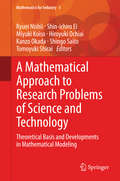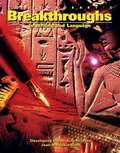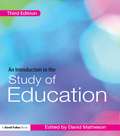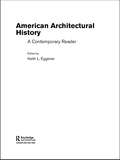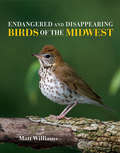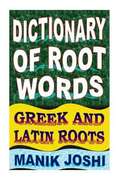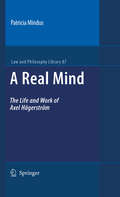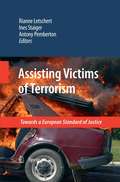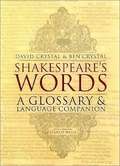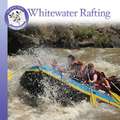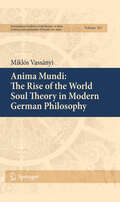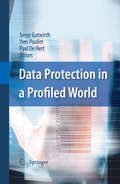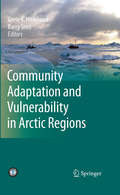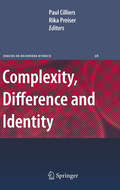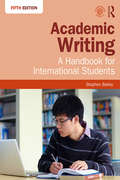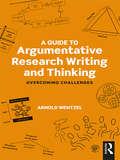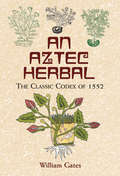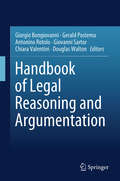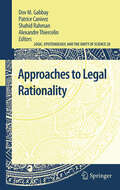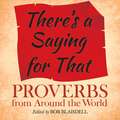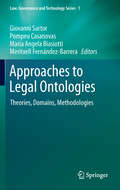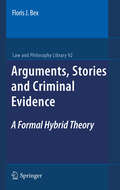- Table View
- List View
Leihmutterschaft und Familie: Impulse aus Recht, Theologie und Medizin
by Edward Schramm Michael WermkeDas Buch betrachtet das Thema Leihmutterschaft aus einer breit angelegten, interdisziplinären Perspektive. In Deutschland ist die Leihmutterschaft verboten, in vielen anderen Ländern legal. Viele Menschen erfüllen sich den Wunsch nach einem Kind daher im Wege einer Leihmutterschaft im Ausland. Das Buch nimmt dies zum Anlass, aktuelle Erkenntnisse und Impulse aus der Rechtswissenschaft, Theologie, Soziologie, kindlichen Entwicklungspsychologie, Medizin, Genetik und Philosophie zu diesem Phänomen aufzugreifen und zu analysieren. Im Mittelpunkt steht die Frage, inwiefern sich das Wohl des Kindes, die Interessen der Leihmütter sowie die Bedürfnisse der Wunscheltern in der deutschen Rechtsordnung, der sozialen Wirklichkeit und den kirchlichen Institutionen widerspiegeln.
AnswerMan HVAC&R Reference Guide (AnswerMan Pocket Reference Books)
by Esco InstituteThe AnswerMan Pocket Reference Guide provides fast and easy answers that would otherwise require a library of textbooks. The AnswerMan Pocket Reference Guide is a handy pocket sized reference manual that every air conditioning and refrigeration technician MUST have. AnswerMan Pocket Reference Guide isn't just a book, it's a tool that you'll use everyday. This book is a compilation of charts, graphs, formulas, and troubleshooting guidelines.
Advances in Computational Social Science: The Fourth World Congress (Agent-Based Social Systems #11)
by Takao Terano Ryuichi Yamamoto Shu-Heng Chen Chung-Ching TaiThis volume is a post-conference publication of the 4th World Congress on Social Simulation (WCSS), with contents selected from among the 80 papers originally presented at the conference. WCSS is a biennial event, jointly organized by three scientific communities in computational social science, namely, the Pacific-Asian Association for Agent-Based Approach in Social Systems Sciences (PAAA), the European Social Simulation Association (ESSA), and the Computational Social Science Society of the Americas (CSSSA). It is, therefore, currently the most prominent conference in the area of agent-based social simulation. The papers selected for this volume give a holistic view of the current development of social simulation, indicating the directions for future research and creating an important archival document and milestone in the history of computational social science. Specifically, the papers included here cover substantial progress in artificial financial markets, macroeconomic forecasting, supply chain management, bank networks, social networks, urban planning, social norms and group formation, cross-cultural studies, political party competition, voting behavior, computational demography, computational anthropology, evolution of languages, public health and epidemics, AIDS, security and terrorism, methodological and epistemological issues, empirical-based agent-based modeling, modeling of experimental social science, gaming simulation, cognitive agents, and participatory simulation. Furthermore, pioneering studies in some new research areas, such as the theoretical foundations of social simulation and categorical social science, also are included in the volume.
A Mathematical Approach to Research Problems of Science and Technology: Theoretical Basis and Developments in Mathematical Modeling (Mathematics for Industry #5)
by Hiroyuki Ochiai Ryuei Nishii Shin-Ichiro Ei Miyuki Koiso Kanzo Okada Shingo Saito Tomoyuki ShiraiThis book deals with one of the most novel advances in mathematical modeling for applied scientific technology, including computer graphics, public-key encryption, data visualization, statistical data analysis, symbolic calculation, encryption, error correcting codes, and risk management. It also shows that mathematics can be used to solve problems from nature, e. g. , slime mold algorithms. One of the unique features of this book is that it shows readers how to use pure and applied mathematics, especially those mathematical theory/techniques developed in the twentieth century, and developing now, to solve applied problems in several fields of industry. Each chapter includes clues on how to use "mathematics" to solve concrete problems faced in industry as well as practical applications. The target audience is not limited to researchers working in applied mathematics and includes those in engineering, material sciences, economics, and life sciences.
Breakthroughs in Writing and Language (Breakthroughs Series)
by Joan Maruskin-Mott<P>"Contemporary's Breakthroughs in Writing and Language is designed to help students develop a firm basis in writing and language skills. Both the process of writing and conventions of English are covered. In particular, there are three features to note: <P>- The ""Journal Writing"" feature provides students with a variety of ideas for writing in their journals. Its main purpose is to help students start to feel comfortable as writers. In this section only, grammar and spelling are not emphasized. <P>- ""Putting Your Skills to Work,"" a highly structured writing activity, appears following language skills exercises. The writing focuses on the grammar point that was just taught. This feature helps students to understand grammar in the context of their own writing. <P>- Somewhat less structured than ""Putting Your Skills to Work,"" ""Your Turn to Write"" gives students a choice of topics and some suggestions about how to approach the topic. ""Your Turn to Write"" is followed by a checklist of a few of the major grammar and usage points in the chapter. The checklist guides students in editing their own writing."
An Introduction to the Study of Education
by David MathesonThis fully updated, fourth edition of An Introduction to the Study of Education provides a comprehensive and reflective introduction to the study of education, inviting students to question what education is, who it is for and what purpose it serves. Taking the reader from the early years through to lifelong learning, it examines all forms of education and learning. This new edition includes ten completely new chapters and a step-by-step guide to essay writing. There is also a companion website to accompany the book, featuring additional chapters which can be visited at www.routledge.com/cw/matheson.This fully updated, fourth edition provides: a full exploration of the historical, sociological, philosophical and psychological roots of education; a clear focus on the individual levels of education - preschool, compulsory, post-compulsory and lifelong learning; the latest debates within special educational needs; an in-depth examination of learning styles; insights into the historical development of education and the role of, and background to, research in education; a focus on current educational practice and diversity across the United Kingdom and Ireland. Written in a clear and accessible style, this is the essential core text for all beginning students on undergraduate and postgraduate courses in Education Studies and all those interested in education today, where it came from and where it is going.
American Architectural History: A Contemporary Reader
by Keith Eggener<p>This major new text presents a collection of recent writings on architecture and urbanism in the United States, with topics ranging from colonial to contemporary times. In terms of content and scope, there is no collection, in or out of print, directly comparable to this one. The essays are drawn from the past twenty years' of publishing in the field, arranged chronologically from colonial to contemporary and accessible in thematic groupings, contextualized and introduced by Keith Eggener. <p>Drawing together 24 illustrated essays by major and emerging scholars in the field, American Architectural History is a valuable resource for students of the history of American art, architecture, urbanism, and material culture.</p>
Endangered and Disappearing Birds of the Midwest
by Matt WilliamsFrom the birds who wake us in the morning with their cheerful chorus to those who flock to our feeders and brighten a gloomy winter day, birds fascinate us with their lively and interesting behavior and provide essential services from controlling pest populations to pollinating crops. And yet for all the benefits they provide, many species across Minnesota, Wisconsin, Illinois, Iowa, Indiana, Michigan, and Ohio are in danger of extinction due to loss of habitat, agricultural expansion, changing forest conditions, and interactions with humans. In Endangered and Disappearing Birds of the Midwest, Matt Williams profiles forty of the most beautiful and interesting birds who winter, breed, or migrate through the Midwest and whose populations are most in danger of disappearing from the region. Each profile includes the current endangered status of the species, a description of the bird's vocal and nesting patterns, and tips to help readers identify them, along with stunning color images and detailed migration maps. An exquisite and timely examination of our feathered friends, Endangered and Disappearing Birds of the Midwest is a call to action to protect these vulnerable and gorgeous creatures that enliven our world.
Dictionary of Root Words Greek and Latin Roots: English Word Power
by Manik JoshiDictionary of Root Words Greek and Latin Roots
A Real Mind: The Life and Work of Axel Hägerström (Law and Philosophy Library #87)
by Patricia MindusThis comprehensive presentation of Axel Hägerström (1868-1939) fills a void in nearly a century of literature, providing both the legal and political scholar and the non-expert reader with a proper introduction to the father of Scandinavian realism. Based on his complete work, including unpublished material and personal correspondence selected exclusively from the Uppsala archives, A Real Mind follows the chronological evolution of Hägerström's intellectual enterprise and offers a full account of his thought. The book summarizes Hägerström's main arguments while enabling further critical assessment, and tries to answer such questions as: If norms are neither true nor false, how can they be adequately understood on the basis of Hägerström's theory of knowledge? Did the founder of the Uppsala school uphold emotivism in moral philosophy? What consequences does such a standpoint have in practical philosophy? Is he really the inspiration behind Scandinavian state absolutism?A Real Mind places the complex web of issues addressed by Hägerström within the broader context of 20th century philosophy, stretching from epistemology to ethics. His philosophy of law is examined in the core chapters of the book, with emphasis on the will-theory and the relation between law and power. The narrative is peppered with vignettes from Hägerström's life, giving an insightful and highly readable portrayal of a thinker who put his imprint on legal theory. The appendix provides a selected bibliography and a brief synopsis of the major events in his life, both private and intellectual.
Assisting Victims of Terrorism: Towards a European Standard of Justice
by Rianne Letschert Antony Pemberton Ines StaigerThe large-scale terrorist attacks on 9/11 resulted in more attention being devoted to victims of terrorist acts. Discussions took place on how their needs could be best accommodated. The Madrid bombings in March 2004 gave further impetus to this process. This development is also part of a recent trend towards general victim of crime policies that branch out into specialized policies devised to meet the needs of particular groups of victims such as victims of trafficking, victims of sexual violence and abuse or victims of traffic accidents. However, although a movement of national and international solidarity relating to addressing the needs of victims of terrorism has developed, political consensus is still fragile. This book provides a thorough analysis of the specific needs of victims of terrorism (using both legal and psycho-social studies), compared to victims of other forms of crime. The study combines different disciplines, enabling to combine the different perspectives leading to synergy in the analysis of the legal and psycho-social needs of victims of terrorism. Furthermore the appropriateness of restorative justice practices in the context of terrorism is included and provides challenging new insights.
Shakespeare's Words: A Glossary and Language Companion
by David Crystal Ben Crystal Stanley WellsA vital resource for scholars, students and actors, this book contains glosses and quotes for over 14,000 words that could be misunderstood by or are unknown to a modern audience. Displayed panels look at such areas of Shakespeare's language as greetings, swear-words and terms of address. Plot summaries are included for all Shakespeare's plays and on the facing page is a unique diagramatic representation of the relationships within each play.
White Water Rafting (Nonfiction Collection)
by Michele DufresneCovers rafting equipment, rowing techniques, trip preparations, and safety, and describes some of the most famous North American rivers.
Anima Mundi: The Rise Of The World Soul Theory In Modern German Philosophy (International Archives of the History of Ideas Archives internationales d'histoire des idées #202)
by Miklós VassányiThis work presents and philosophically analyzes the early modern and modern history of the theory concerning the soul of the world, anima mundi. The initial question of the investigation is why there was a revival of this theory in the time of the early German Romanticism, whereas the concept of the anima mundi had been rejected in the earlier, classical period of European philosophy (early and mature Enlightenment). The presentation and analysis starts from the Leibnizian-Wolffian school, generally hostile to the theory, and covers classical eighteenth-century physico-theology, also reluctant to accept an anima mundi. Next, it discusses early modern and modern Christian philosophical Cabbala (Böhme and Ötinger), an intellectual tradition which to some extent tolerated the idea of a soul of the world. The philosophical relationship between Spinoza and Spinozism on the one hand, and the anima mundi theory on the other is also examined. An analysis of Giordano Bruno's utilization of the concept anima del mondo is the last step before we give an account of how and why German Romanticism, especially Baader and Schelling asserted and applied the theory of the Weltseele. The purpose of the work is to prove that the philosophical insufficiency of a concept of God as an ens extramundanum instigated the Romantics to think an anima mundi that can act as a divine and quasi-infinite intermediary between God and Nature, as a locum tenens of God in physical reality.
Data Protection in a Profiled World
by Paul De Hert Yves Poullet Serge GutwirthOne of the most challenging issues facing our current information society is the accelerating accumulation of data trails in transactional and communication systems, which may be used not only to profile the behaviour of individuals for commercial, marketing and law enforcement purposes, but also to locate and follow things and actions. Data mining, convergence, interoperability, ever- increasing computer capacities and the extreme miniaturisation of the hardware are all elements which contribute to a major contemporary challenge: the profiled world. This interdisciplinary volume offers twenty contributions that delve deeper into some of the complex but urgent questions that this profiled world addresses to data protection and privacy. The chapters of this volume were all presented at the second Conference on Privacy and Data Protection (CPDP2009) held in Brussels in January 2009 (www.cpdpconferences.org). The yearly CPDP conferences aim to become Europe's most important meeting where academics, practitioners, policy-makers and activists come together to exchange ideas and discuss emerging issues in information technology, privacy and data protection and law. This volume reflects the richness of the conference, containing chapters by leading lawyers, policymakers, computer, technology assessment and social scientists. The chapters cover generic themes such as the evolution of a new generation of data protection laws and the constitutionalisation of data protection and more specific issues like security breaches, unsolicited adjustments, social networks, surveillance and electronic voting. This book not only offers a very close and timely look on the state of data protection and privacy in our profiled world, but it also explores and invents ways to make sure this world remains a world we want to live in.
Community Adaptation and Vulnerability in Arctic Regions: Framework Document For An International Polar Year Consortium
by Barry Smit Grete K. HovelsrudUnder the auspices of International Polar Year (IPY), the CAVIAR consortium was formed with partners from all eight Arctic countries. The aim of the interdisciplinary CAVIAR project is to increase understanding of the vulnerability of Arctic communities to changing environmental conditions, including climate change, and to contribute to the development of adaptive strategies and policies. In partnership with local collaborators in over two dozen communities, researchers have documented the conditions and forces that contribute to vulnerabilities, identified adaptive strategies and attempted to assess the prospects for adaptation in the future.
Complexity, Difference and Identity: An Ethical Perspective (Issues in Business Ethics #26)
by Rika Preiser Paul Cilliers"Complexity" has been part of the academic discourse for a decade or two. Texts on Complexity fall mainly in two categories: fairly technical and mathematical on the one hand, and fairly broad, vague and general on the other. Paul Cilliers' book Complexity and Postmodernism. Understanding Complex Systems (Routledge 1998) constituted an attempt to bridge this divide by reflecting more rigorously on the philosophical implications of complexity, and by making it accessible to the social sciences. This edited volume is a continuation of this project, with specific reference to the ethical implications of acknowledging complexity. These issues are pertinent to our understanding of organisations and institutions and could contribute significantly to the development of a richer understanding of ethics in business and would be a useful tool for teachers, researchers and post-graduate students with ethical concerns in disciplines ranging from Philosophy, Applied Ethics, Sociology, Organisational Studies, Political Science, Anthropology and Cultural Studies. The central theme which binds all the contributions together is: the inevitability of normative and ethical issues when dealing with complex phenomena. The book should thus be useful in the development of Business Ethics on two levels: in the first place on the level of developing a strong theoretical foundation, in the second place in providing specific examples of this theory in action in the real world.
Academic Writing: A Handbook for International Students
by Stephen BaileyNow in its fifth edition, Academic Writing helps international students succeed in writing essays and reports for their English-language academic courses. Thoroughly revised and updated, it is designed to let teachers and students easily find the topics they need, both in the classroom and for self-study. The book consists of five parts: The Writing Process Elements of Writing Language Issues Vocabulary for Writing Writing Models The first part explains and practises every stage of essay writing, from choosing the best sources, reading and note-making, through to referencing and proofreading. The four remaining parts, organised alphabetically, can be taught in conjunction with the first part or used on a remedial basis. A progress check at the end of each part allows students to assess their learning. All units are fully cross-referenced, and a complete set of answers to the practice exercises is included. New topics in this edition include Writing in Groups, Written British and American English, and Writing Letters and Emails. In addition, the new interactive website has a full set of teaching notes as well as more challenging exercises, revision material and links to other sources. Additional features of the book include: Models provided for writing tasks such as case studies and essays Use of authentic academic texts from a wide range of disciplines Designed for self-study as well as classroom use Useful at both undergraduate and postgraduate level Glossary to explain technical terms, plus index Written to deal with the specific language issues faced by international students, this practical, user-friendly book is an invaluable guide to academic writing in English.
A Guide to Argumentative Research Writing and Thinking: Overcoming Challenges
by Arnold WentzelResearch is difficult. Even though students are trained in the basic research methodology skills, when confronted with research writing, it feels to them as if they enter a bizarre world, with its own language and conventions, where it is hard to get things right. This book translates the apparent complexities of research writing into everyday ideas, language and skills, and will enable novice researchers to start overcoming the major stumbling blocks immediately. This book focuses only on the greatest challenges in research writing, specifically those that supervisors find most difficult to explain to novice researchers. These challenges include both basic and more complex skills, such as: finding original research contributions; establishing one’s voice while drawing on other authors; turning a vague idea into a feasible research question; generating literature reviews that are original in themselves; and avoiding list-like writing when discussing the research methodology. Wentzel shows that it is easier to overcome these challenges, not with lists of prescriptions that are difficult to remember while writing, but rather by cultivating an argumentative mindset. Not only is such a mindset much easier to maintain, but it offers a central point around which one can organise any difficult writing task. The book shows how to use the argumentative mindset to approach every important writing challenge. It translates all the necessary skills into jargon-free language using a variety of visuals and simple step-by-step procedures that will enable any person to read the book quickly and start writing immediately. The book is accompanied by a website containing an instructor’s manual with guidance on the teaching and assessment of research writing, as well as lecture slides.
An Aztec Herbal: The Classic Codex of 1552 (Native American)
by William GatesOriginally written in the Aztec language, this 16th-century codex was the first herbal and medical text compiled in the New World. It contains ancient remedies for myriad ailments -- boils, hair loss, cataracts, insomnia hiccoughs, and gout, to name a few. Analytical Index to Plants. New Introduction. Over 180 black-and-white and 38 color illustrations.
Handbook of Legal Reasoning and Argumentation
by Giorgio Bongiovanni Gerald Postema Antonino Rotolo Giovanni Sartor Chiara Valentini Douglas WaltonThis handbook addresses legal reasoning and argumentation from a logical, philosophical and legal perspective. The main forms of legal reasoning and argumentation are covered in an exhaustive and critical fashion, and are analysed in connection with more general types (and problems) of reasoning. Accordingly, the subject matter of the handbook divides in three parts. The first one introduces and discusses the basic concepts of practical reasoning. The second one discusses the general structures and procedures of reasoning and argumentation that are relevant to legal discourse. The third one looks at their instantiations and developments of these aspects of argumentation as they are put to work in the law, in different areas and applications of legal reasoning.
Approaches to Legal Rationality (Logic, Epistemology, and the Unity of Science #20)
by Dov M. Gabbay Patrice Canivez Shahid Rahman Alexandre ThiercelinLegal theory, political sciences, sociology, philosophy, logic, artificial intelligence: there are many approaches to legal argumentation. Each of them provides specific insights into highly complex phenomena. Different disciplines, but also different traditions in disciplines (e.g. analytical and continental traditions in philosophy) find here a rare occasion to meet. The present book contains contributions, both historical and thematic, from leading researchers in several of the most important approaches to legal rationality. One of the main issues is the relation between logic and law: the way logic is actually used in law, but also the way logic can make law explicit. An outstanding group of philosophers, logicians and jurists try to meet this issue. The book is more than a collection of papers. However different their respective conceptual tools may be, the authors share a common conception: legal argumentation is a specific argumentation context.
There's a Saying for That: Proverbs from Around the World
by Bob BlaisdellForbidden fruit is the sweetest, and he who wants to beat a dog is sure to find a stick! This compilation of the best proverbs from around the world -- ancient and modern -- offers concise, time-honored wisdom about love, money, politics, and human nature. A handsome gift-book format makes this volume an ideal present.
Approaches to Legal Ontologies: Theories, Domains, Methodologies (Law, Governance and Technology Series #1)
by Giovanni Sartor Mariangela Biasiotti Meritxell Fernández-Barrera Pompeu CasanovasThe book provides the reader with a unique source regarding the current theoretical landscape in legal ontology engineering as well as on foreseeable future trends for the definition of conceptual structures to enhance the automatic processing and retrieval of legal information in the Semantic Web framework. It will thus interest researchers in the domains of the SW, legal informatics, Artificial Intelligence and law, legal theory and legal philosophy, as well as developers of e-government applications based on the intelligent management of legal or public information to provide both back-office and front-office support.
Arguments, Stories and Criminal Evidence: A Formal Hybrid Theory (Law and Philosophy Library #92)
by Floris J. BexIn this book a theory of reasoning with evidence in the context of criminal cases is developed. The main subject of this study is not the law of evidence but rather the rational process of proof, which involves constructing, testing and justifying scenarios about what happened using evidence and commonsense knowledge. A central theme in the book is the analysis of ones reasoning, so that complex patterns are made more explicit and clear. This analysis uses stories about what happened and arguments to anchor these stories in evidence. Thus the argumentative and the narrative approaches from the research in legal philosophy and legal psychology are combined. Because the book describes its subjects in both an informal and a formal style, it is relevant for scholars in legal philosophy, AI, logic and argumentation theory. The book can also appeal to practitioners in the investigative and legal professions, who are interested in the ways in which they can and should reason with evidence.
